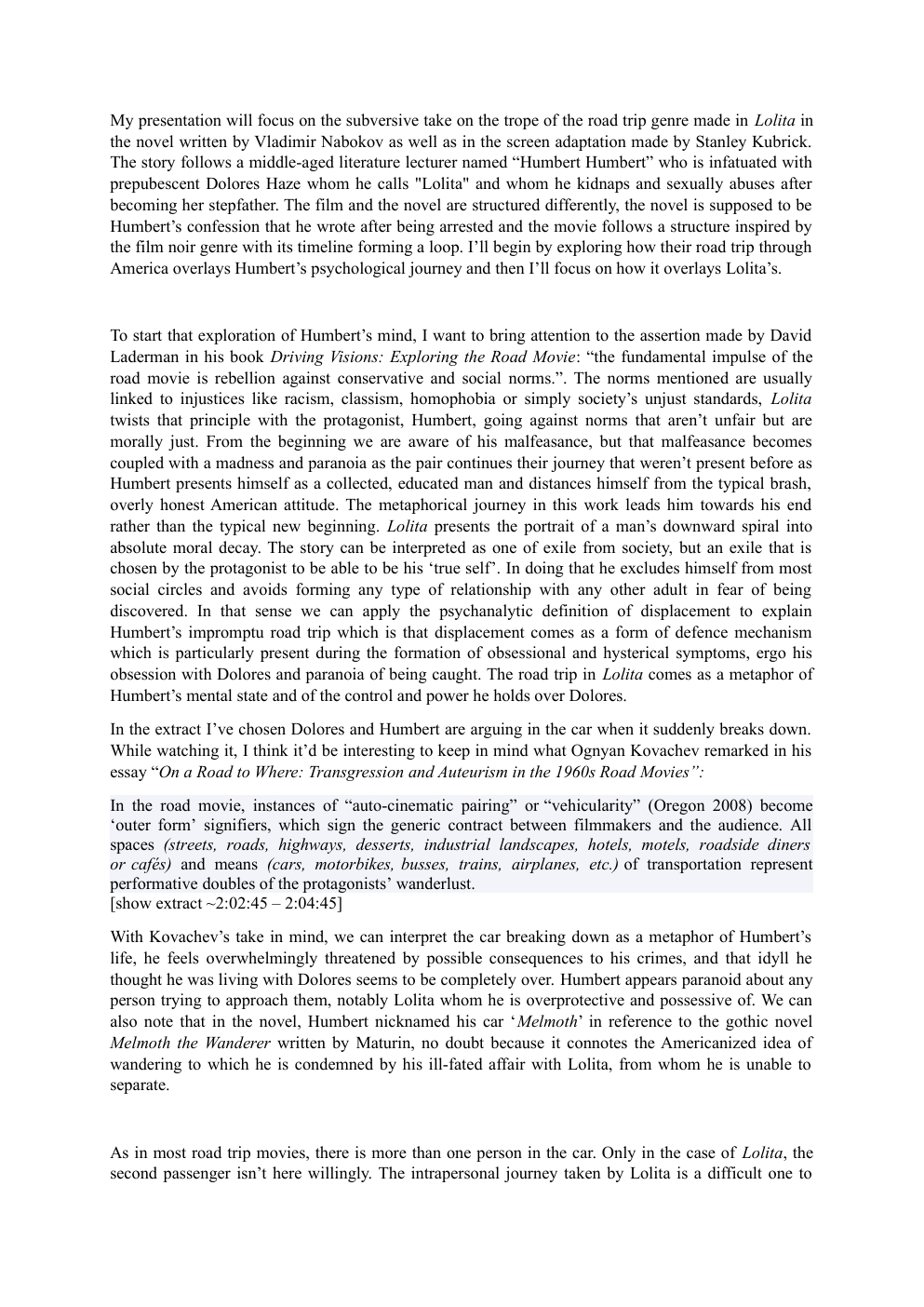Lolita : A subversive take on the roadtrip genre
Publié le 15/11/2023
Extrait du document
«
My presentation will focus on the subversive take on the trope of the road trip genre made in Lolita in
the novel written by Vladimir Nabokov as well as in the screen adaptation made by Stanley Kubrick.
The story follows a middle-aged literature lecturer named “Humbert Humbert” who is infatuated with
prepubescent Dolores Haze whom he calls "Lolita" and whom he kidnaps and sexually abuses after
becoming her stepfather.
The film and the novel are structured differently, the novel is supposed to be
Humbert’s confession that he wrote after being arrested and the movie follows a structure inspired by
the film noir genre with its timeline forming a loop.
I’ll begin by exploring how their road trip through
America overlays Humbert’s psychological journey and then I’ll focus on how it overlays Lolita’s.
To start that exploration of Humbert’s mind, I want to bring attention to the assertion made by David
Laderman in his book Driving Visions: Exploring the Road Movie: “the fundamental impulse of the
road movie is rebellion against conservative and social norms.”.
The norms mentioned are usually
linked to injustices like racism, classism, homophobia or simply society’s unjust standards, Lolita
twists that principle with the protagonist, Humbert, going against norms that aren’t unfair but are
morally just.
From the beginning we are aware of his malfeasance, but that malfeasance becomes
coupled with a madness and paranoia as the pair continues their journey that weren’t present before as
Humbert presents himself as a collected, educated man and distances himself from the typical brash,
overly honest American attitude.
The metaphorical journey in this work leads him towards his end
rather than the typical new beginning.
Lolita presents the portrait of a man’s downward spiral into
absolute moral decay.
The story can be interpreted as one of exile from society, but an exile that is
chosen by the protagonist to be able to be his ‘true self’.
In doing that he excludes himself from most
social circles and avoids forming any type of relationship with any other adult in fear of being
discovered.
In that sense we can apply the psychanalytic definition of displacement to explain
Humbert’s impromptu road trip which is that displacement comes as a form of defence mechanism
which is particularly present during the formation of obsessional and hysterical symptoms, ergo his
obsession with Dolores and paranoia of being caught.
The road trip in Lolita comes as a metaphor of
Humbert’s mental state and of the control and power he holds over Dolores.
In the extract I’ve chosen Dolores and Humbert are arguing in the car when it suddenly breaks down.
While watching it, I think it’d be interesting to keep in mind what Ognyan Kovachev remarked in his
essay “On a Road to Where: Transgression and Auteurism in the 1960s Road Movies”:
In the road movie, instances of “auto-cinematic pairing” or “vehicularity” (Oregon 2008) become
‘outer form’ signifiers, which sign the generic contract between filmmakers and the audience.
All
spaces (streets, roads, highways, desserts, industrial landscapes, hotels, motels, roadside diners
or cafés) and means (cars, motorbikes, busses, trains, airplanes, etc.) of transportation represent
performative doubles of the protagonists’ wanderlust.
[show extract ~2:02:45 – 2:04:45]
With Kovachev’s take in mind, we can interpret the car breaking down as a metaphor of Humbert’s
life, he feels overwhelmingly threatened by possible consequences to his crimes, and that....
»
↓↓↓ APERÇU DU DOCUMENT ↓↓↓
Liens utiles
- Does the "access" or "service" model that has replaced the "ownership" model in the business practice of companies such as Kindle/Amazon take fairly into account the interests and/or rights of the consumers?
- Song of the Open Road Leaves of Grass, 1900 Walt Whitman 1 Afoot and light-hearted, I take to the open road, Healthy, free, the world before me, The long brown path before me, leading wherever I choose.
- Priam Greek King of Troy during the Trojan War, though too old to take an active part in the war.
- shoulders, "Promise me you'll take care," she said, pulling the hood of my coat over my head, "Promise me you'll take extra-special care.
- exposé anglais introduction to the Consumer Society


